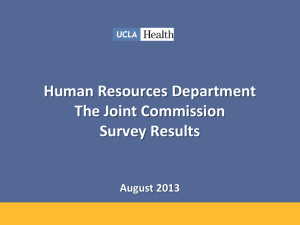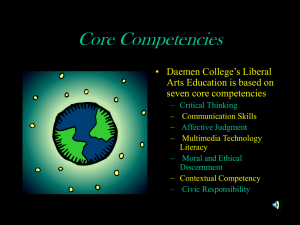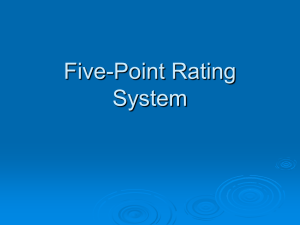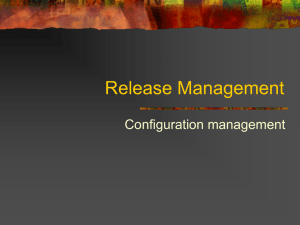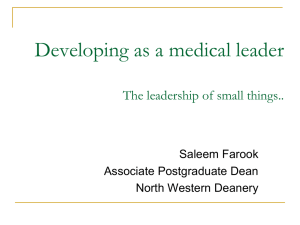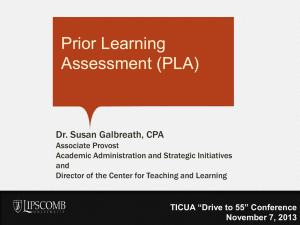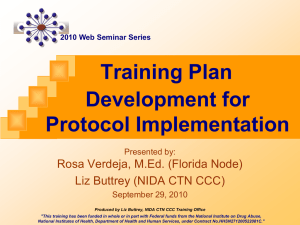core competencies of nurse educators
advertisement
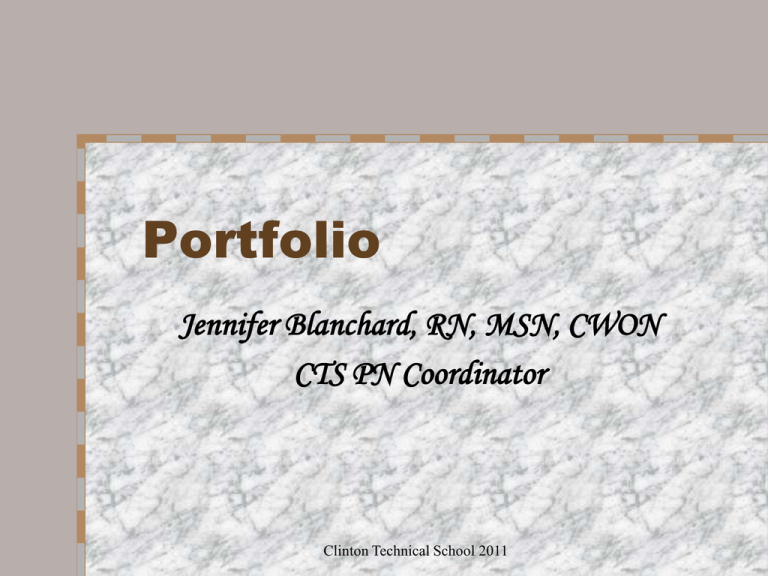
Portfolio Jennifer Blanchard, RN, MSN, CWON CTS PN Coordinator Clinton Technical School 2011 Table of Contents I. II. III. IV. V. VI. Overall Reflection Core Competencies of Nurse Educators Artifacts for Scholarly Activity Professional Development Plan Leadership and Vision Communicating Nursing Reasoning Interacting Managing Information Professional Valuing Clinton Technical School 2011 Overall Reflection My philosophy of teaching involves the caring phenomenon (Coyle-Rogers & Cramer, 2005). I believe in fostering an environment of compassion in nursing education for successful transference of this fundamental competency into practice. Trust and respect are multi-focal and require a commitment from both parties in the learning process. It is my hope and goal that my own dedication to continual improvement will be reflected in my pedagogy and overall student outcomes. Coyle-Rogers, P. & Cramer, M. (2005). The phenomenon of caring: The perspectives of nurse educators. Journal for Nurses in Staff Development 21(4), 160-170. Retrieved from Ovid database. Clinton Technical School 2011 NLN (2005) CORE COMPETENCIES OF NURSE EDUCATORS © Competency 1 – Facilitate Learning Competency 2 – Facilitate Learner Development and Socialization Competency 3 – Use Assessment and Evaluation Strategies Competency 4 – Participate in Curriculum Design and Evaluation of Program Outcomes Competency 5 - Function as a Change Agent and Leader Competency 6 - Pursue Continuous Quality Improvement in the Nurse Educator Role Competency 7 – Engage in Scholarship Competency 8 – Function within the Educational Environment National League of Nursing (NLN). (2005) Core competencies of nurse educators. Retrieved from http://www.nln.org/facultydevelopment/pdf/corecompetencies.pdf. Clinton Technical School 2011 Competency 1 – Facilitate Learning This competency is based on effectively facilitating learning in the classroom, clinical, and clinical settings via the cognitive, affective, and psychomotor domains. Overall Reflection Licensure Certification Artifacts for Scholarly Activity Clinton Technical School 2011 Competency 2 – Facilitate Learner Development and Socialization This competency is based on helping students to develop into the nurse role, and ensuring congruency of effective socialization behaviors. Overall Reflection Artifacts for Scholarly Activity Clinton Technical School 2011 Competency 3 – Use Assessment and Evaluation Strategies This competency is based on using variety in the art of formal and informal assessment techniques in the classroom, clinical, and laboratory settings. Artifacts for Scholarly Activity Professional Development Plan Personal Goals Clinton Technical School 2011 Competency 4 – Participate in Curriculum Design and Evaluation of Program This competency is based on the nurse educator’s ability to formulate and participate in contemporary healthcare based student outcomes in curriculum design. Artifacts for Scholarly Activity Clinton Technical School 2011 Competency 5 - Function as a Change Agent and Leader This competency is based on the nurse educator’s role in implementing needed and effective change. Artifacts for Scholarly Activity Clinton Technical School 2011 Competency 6 - Pursue Continuous Quality Improvement in the Nurse Educator Role This competency is based on the commitment to continuous self-improvement in nursing education. Overall Reflection Artifacts for Scholarly Activity Professional Development Plan Personal Goals Clinton Technical School 2011 Competency 7 – Engage in Scholarship This competency is based on the role and responsibility of partaking in nursing scholarship. Artifacts for Scholarly Activity Professional Development Plan Clinton Technical School 2011 Competency 8 – Function within the Educational Environment This competency is based on the understanding and advocacy of the history and present trends in nursing education, including political, institutional, and economic impacts that affect decision making processes. Overall Reflection Artifacts for Scholarly Activity Professional Development Plan Clinton Technical School 2011 Leadership and Vision Personal Goals Prepare adult men and women to function safely and effectively as entrylevel nurses within the guidelines established by the Missouri Nurse Practice Act. Promote human dignity of the individual regardless of condition, race, nationality, creed, or handicap in hopes that students will apply this knowledge to meet the emotional, physical, spiritual, and social needs of patients. Integrate the restorative promotion and maintenance of physical and mental health, and the prevention of illness for individuals and groups throughout the life cycle in pedagogical strategies and assessment techniques. Teach these concepts using a variety of methods suited to adult learning, relating previous experiences to newly presented material. Clinton Technical School 2011 Leadership and Vision Cont’ What I’ve done: Artifacts for Scholarly Activity My current reflections: Overall Reflection My future plans: Professional Development Plan Clinton Technical School 2011 Communicating Outcome definition: Reciprocal process utilizing multiple modes (Effective, Oral, Written, Therapeutic, Media, and Technological) in adapting language and communication strategies appropriate to nursing practice roles and settings. What I’ve done: Artifacts for Scholarly Activity My current reflections: Overall Reflection My future plans: Professional Development Plan Clinton Technical School 2011 Nursing Reasoning Outcome Definition: Intellectual skill based on the use of theories and principles guided by logic and sound judgment to allow for the provision of nursing care. Use of reasoning to assess, plan, intervene and evaluate while providing holistic care in diverse environments utilizing pertinent resources. What I’ve done: Artifacts for Scholarly Activity My current reflections: Overall Reflection My future plans: Professional Development Plan Clinton Technical School 2011 Interacting Outcome Definition: Active engagement in interaction based on mutual respect with collaboration toward goal achievement to nursing roles and settings. What I’ve done: Artifacts for Scholarly Activity My current reflections: Overall Reflection My future plans: Professional Development Plan Clinton Technical School 2011 Managing Information Outcome Definition: (Finding Information-Accessing, Inputting, Retrieving): Consistently utilizes basic information management skills to obtain and organize a broad range of advanced practice data and advanced practice professional issues. What I’ve done: Artifacts for Scholarly Activity My current reflections: Overall Reflection My future plans: Professional Development Plan Clinton Technical School 2011 Professional Valuing Outcome Definition: The demonstration of ethically grounded professional nursing behaviors reflective of the ANA Standards of Advanced Nursing Practice (1996) and ANA Code for Nurses (2001). What I’ve done: Artifacts for Scholarly Activity My current reflections: Overall Reflection My future plans: Professional Development Plan Clinton Technical School 2011 Artifacts for Scholarly Activity Currently Coordinator for CTS PN Program Initiated, proposed, developed, and implemented all new program management including curriculum framework Philosophy and Vision Curriculum Guide 16 Syllabi Clinical tools and rubrics Clinical Affiliation Agreements Faculty and Student Policy and Procedures Faculty Bylaws and Governance Organization Systematic Program Evaluation Tool 2011 Graduate UCM Masters Family Rural Nursing: Nurse Educator Track Research project in Graduate Orientation Innovation Preceptor/Guest Speaker for Wound Ostomy Nursing Specialty National American University students 2008 Taught CEU Courses for Multiple Professions/Laypersons 16 hours CEU Wound Ostomy for RN, LPN, PT, OT, PTA 2008 Ostomy Education Courses 2007-2011 Diabetic Education Courses 2007-2011 Co-authored policies and procedures GVMH Wound Care Clinic 2007 Clinton Technical School 2011 Licensure MSBN Clinton Technical School 2011 Certification Current AHA BLS Instructor and Healthcare Provider (expiration Feb 2012) Current DESE Teaching Certificate Clinton Technical School 2011 Professional Development Plan Maintain DESE Teaching Certificate Obtain CNE Obtain Doctoral Degree within the next 10 years Maintain certification as a BLS Instructor from AHA Maintain CWON certification Attend 1-2 continuing education seminars per year Obtain membership in Sigma Theta Tau International, NLN, MLN, ANA, and/or MONA organizations Maintain membership in MCPNE organizations Remain active in CTS PN Faculty Governance Clinton Technical School 2011

